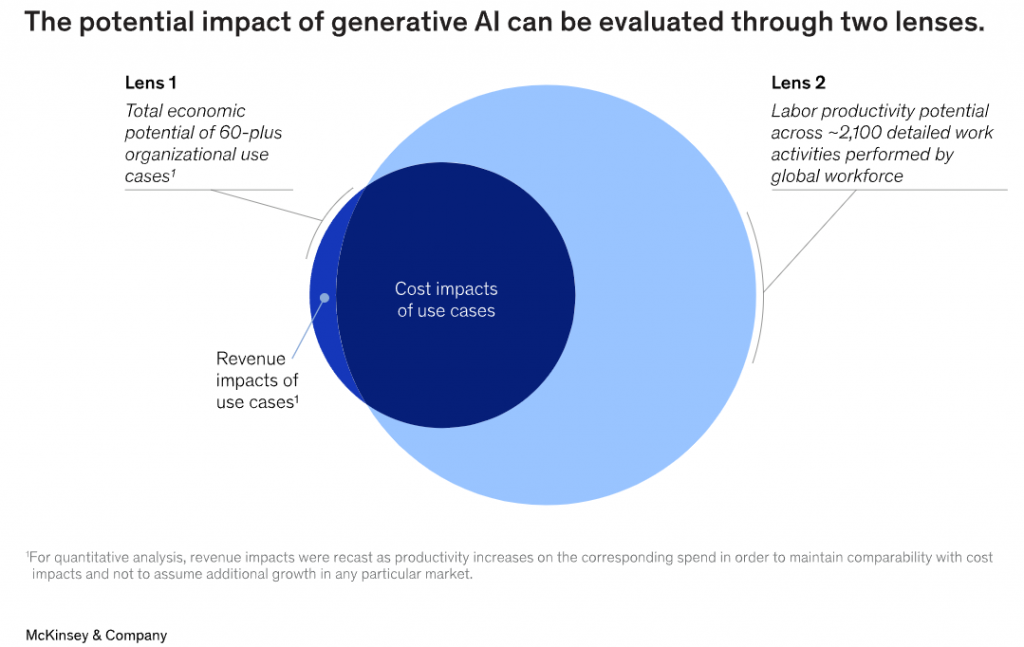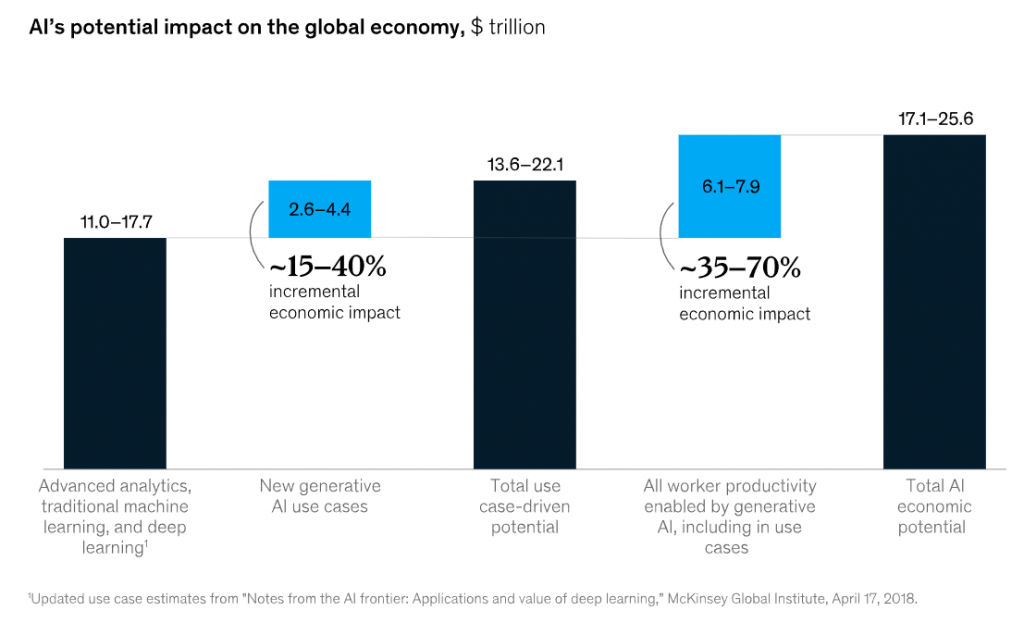
Generative AI, a rapidly advancing field, has the power to revolutionise multiple industries by automating tasks and creating new economic opportunities. Generative AI can contribute between $2.6 trillion and $4.4 trillion every year to the global economy, says a McKinsey report. This is a remarkable figure considering that the UK economy is valued at around $3.1 trillion.
With its broad utility and conversational abilities, generative AI applications like ChatGPT and Bard have garnered wide acceptance worldwide, impacting businesses and society at large. Industries such as retail, finance, healthcare, and manufacturing stand to experience significant transformations driven by generative AI:
Retail: Personalised product recommendations, marketing content generation, and optimised product design.
Finance: Financial data analysis, risk model creation, and trading strategy generation.
Healthcare: New drug and treatment development, personalised patient care, and medical simulations.
Manufacturing: Product design innovation, production process optimisation, and waste reduction.
These examples showcase the potential of generative AI to enhance productivity and create fresh economic prospects. However, it is crucial to acknowledge that generative AI may also displace some workers. Consequently, the implementation of policies supporting affected individuals in transitioning to new roles becomes imperative.
The majority of generative AI’s economic value will be realised in areas such as customer operations, marketing and sales, software engineering, and research and development. Generative AI has already demonstrated its capability to engage customers, create compelling content for marketing and sales, and generate computer code based on natural-language prompts.
READ I Beyond renewables: Innovative climate change strategies for a sustainable world
Economic benefits of generative AI
Generative AI offers vast economic benefits by automating tasks, thereby boosting productivity, and enabling workers to focus on more creative and strategic endeavours. This promises higher profits for businesses and higher wages for workers.
The technology can also create fresh economic opportunities across sectors such as development of innovative products and services, generation of new marketing campaigns, and optimisation of supply chains, contributing to economic growth and job creation.


Impact on the workforce
Generative AI’s impact on the workforce is complex. While it may displace workers currently engaged in automatable tasks, it also has the potential to generate new job opportunities in fields like software development, data science, and customer service.
The impact on the workforce varies by industry and country, with the manufacturing sector expected to experience more significant effects than the service sector.
Policy Implications
The rapid development of generative AI raises various policy considerations. Ensuring the widespread sharing of the benefits necessitates policies that assist displaced workers in transitioning to new employment opportunities.
Additionally, regulation of generative AI usage to ensure responsible and ethical practices is crucial. Addressing issues such as bias, privacy, and security is fundamental in establishing effective policies.
Future of generative AI
The future of generative AI remains uncertain, yet its transformative potential is undeniable. There is a need to explore ways to harness this technology for the benefit of all. By carefully managing associated risks and opportunities, we can shape the technology to be a force that benefits everyone.
Beyond its economic advantages, the new technology also possesses the capacity to positively impact society. It can create personalised and engaging educational experiences, spur the development of new art forms and entertainment, and enhance our understanding of the world.
Artificial intelligence has created huge excitement, but what we witness is just the dawn of a new era. The full potential of the technology will be known in the coming years, and there are numerous challenges to overcome. Most important among them are: managing the risks inherent in generative AI, equipping the workforce with new skills, and rethinking core business processes.
Generative AI is a powerful technology capable of driving global economic transformation. It is crucial to navigate its risks and opportunities wisely to ensure it becomes a force for the greater good. By doing so, artificial intelligence’s potential to reshape industries can be tapped through bolstering productivity, and creating a prosperous future.
(This article has been written with artificial intelligence inputs.)
